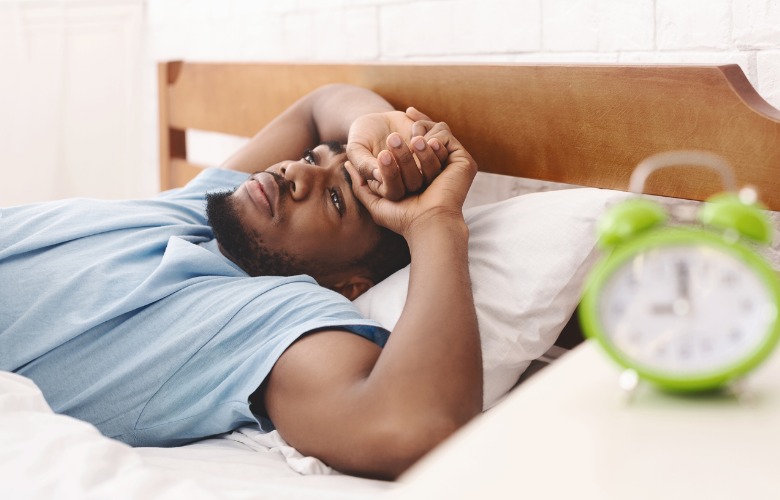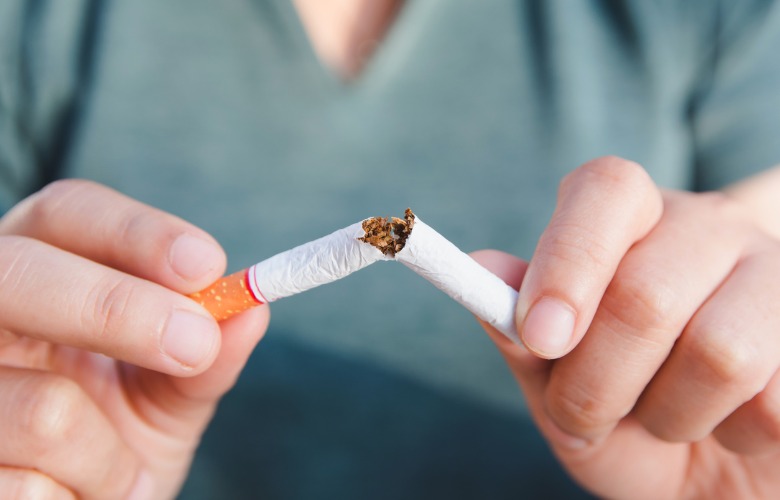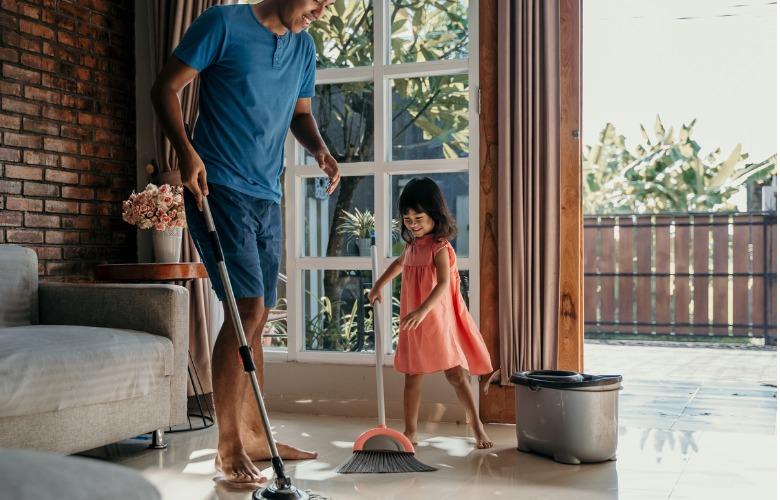5 Ways to Stay Healthy When Stuck at Home
Posted by Jemile Nesimi Hobson, B.A. on Oct 12, 2024
Coronavirus (COVID–19) is now a global pandemic that has quarantined many of us at home and many more are practicing social distancing. Anxiety and stress levels are high, and many are facing working at home while trying to keep up with children’s schoolwork and meeting elderly relatives' needs. There are ways you can practice self-care and stay healthy while at home. Keeping up healthy habits like staying active and eating healthy is important. Other ways to make this time healthier is to reduce stress, get enough sleep, quit smoking, and spring clean.
1. Stay active
With many gyms and yoga studios closed, physical activity may become harder to do. However, you can still get outside and take a walk, jog, or take the bicycle that is collecting dust for a ride. Home with your kids get them involved! Remember to keep a safe distance from other people – about six feet.
Why should I keep my fitness routine?
Regular exercise can reduce stress and anxiety. Of course, there are many health benefits including improving your overall wellness, keeping your mind sharp and reducing your risk of some diseases – like heart disease.
Other ways to stay fit while stuck at home
- At-home exercises the old-fashioned way – squats, push-ups, planks, burpees, and jump rope.
- Use all those water bottles you have laying around as weights.
- Yardwork and gardening are both great active past times.
- Fitness and yoga instructors are offering free online virtual classes right now.
- Follow a fitness video on YouTube or Netflix – this a great way to do yoga, Zumba or whatever other cardio class you usually take.
- Clear the clothes off the exercise bike, row machine or treadmill you may have in your house.
- Find a hike near your house and reap the benefits of both exercise and the outdoors – keeping 6 feet away from your fellow hikers, of course.

2. Immune boosting diet
Stress eating is understandable when the climate is changing so rapidly, and worries are at a high. In addition, many people stocked up on grains and canned foods but skipped the produce. I know the shelves in my own supermarket were cleaned out, but the produce area was abundant. As humans, we use emotional eating to suppress and calm our negative emotions. Often the foods we reach for are sugar-filled and high-fat comfort foods. Add in the panicked shopping many have done to meet the current crisis, our emotions were probably doing more shopping than our brains understandably.
When high stress is prolonged our adrenal glands secrete cortisol – our stress hormone. Cortisol increases our appetites, increases our motivation to eat and even after we indulge in comfort foods will stay elevated as long as our stress response remains triggered. However, it is important to balance indulges with healthier food. Not only for your overall wellness but your immune system needs to be at it best.
Ways to eat healthier and support better nutrition
- Avoid panic buying so everyone in your community can get what they need.
- Frozen vegetables are a great way to keep produce for a longer time.
- Fresh vegetables like Brussel sprouts, sweet potatoes, and broccoli can be kept a long time.
- Buy fresh fruits and vegetables – chop them up and freeze them yourself.
- Create meals with stuff you already have in your house – you know that bag of quinoa you bought in January.
- Foods that have been shown to provide stress relief are avocados, green tea, Swiss chard, salmon or omega-3 rich fish, carrots, and nuts.
- Stock up on vitamins that help support your immune system – like Vitamin C or Zinc.
- Herbs such as Echinacea, Olive Leaf, Elderberry and Ginger.
- Anti-viral herbs such as Garlic and Oregano Leaf can help boost your immune system as well.
- Stress-eating can also be accompanied by stress-drinking. If you drink alcohol, drink moderately and make sure you keep your hydration up. Lots of water to balance some of the dehydration alcohol can cause.

3. Get Enough Sleep and Relax
How important is sleep?
Stress can cause disruptions to your regular sleeping pattern, mix in suddenly working from home, spending more time indoors and change to the lifestyle you can throw off your circadian rhythm. Your circadian rhythm is your own personal 24-hour internal clock that your brain establishes cycles between alertness and sleepiness. These are also known as sleep/wake/sleep cycles. Ever feel tired at the exact time every day? That is your circadian rhythm hard at work. For most Americans, this time sleepiness occurs during the late afternoon and in the middle of the night.
The part of your brain that controls your circadian rhythm is called the hypothalamus, which can be impacted by light and dark. Your eyes tell the hypothalamus that it is dark, and you get sleepy. Your brain is then signaled which tells your body to release melatonin and you are ready for bed! Vice versa for light – your body says wake up! The best way to keep your circadian rhythm going is to establish regular sleep hours – including weekends – by going to sleep and waking up at the same time each day.
Other ways to help relax you and support sleep
- Deep breathing can be done almost anywhere and is a quick method of reducing stress.
- Taking a hot bath can help relieve tension in muscles.
- Laughing, listening to music, or enjoying a cup of tea.
- Stay active. According to Charlene Gamaldo, M.D., medical director of Johns Hopkins Center for Sleep, studies show, “We have solid evidence that exercise does, in fact, help you fall asleep more quickly and improves sleep quality”.
- Don’t let your bedroom get too cold or too warm – feeling uncomfortable can keep you from going to sleep or staying asleep.
- Wear comfortable clothes to bed – again you should be as comfortable as you can before going to sleep.
- Turn off your phone – turn it on airplane mode – keep the flashing blue light from your eyes because it may affect brainwaves and the body may produce less melatonin.
- Try to avoid looking at the news or other media right before going to sleep as this may increase your stress and anxiety levels.
- Fill the room with relaxing scents through aromatherapy or directly on your skin – lavender, ylang-ylang, bergamot orange, sandalwood, and cedarwood essential oils can be helpful
- Curl up with a good book: reading can make the mind wander and tire your eyes - both make you sleepy.
- Take herbs that support sleep – valerian root, lemon balm, and magnolia bark can all help you get a better sleep.
- Melatonin can also be a good supplement to help you rebalance your circadian rhythm.
How to do meditation
While it is nice to create a small, quiet spot where you can light candles or incense and create an oasis for yourself, this is not necessary. All you need to do is:
- Find a chair, bench or cushion and sit in a way that you find comfortable.
- Cross your legs comfortably in front of you.
- Straighten your back, but don’t stiffen it.
- Let your hands fall to your side and let your body remain slack but in position.
- Lower your chin and let your eyes gaze on whatever is in front of you, gently falling downward.
- Now be there: feel your breath and relax

4. Stop smoking or vaping
There was never a better time to quit these two very unhealthy habits. COVID – 19 is a respiratory illness and your lungs need to be in top shape. In fact, it hasn’t been fully studied yet, but scientists believe that smoking or vaping can make the virus worse and are already “linked to lung inflammation and lowered immune function” according to Scientific American.
“All these things make me believe that we are going to have more severe cases—especially [in] people who are [long-term] smokers or vapers,” says Melodi Pirzada, chief of pediatric pulmonology at NYU Winthrop Hospital on Long Island.* She has not treated COVID-19 patients herself, “but it is definitely common sense to think that once you have a history of smoking or vaping, the whole airways, the defense mechanism of your lungs—everything changes,” she says.
A few ways to help you quit smoking:
- Acupuncture is a very effective way to quit smoking by addressing nicotine addiction. Traditional Chinese medicine approaches the physical, mental, and emotional addiction and has been shown to reduce cravings and relieve withdrawal symptoms.
- A helpful formula in your quest to stop smoking is Seven Forests Ardisia 16. This formula is based on the traditional formula, Chai Hu Jia Long Gu Mu Li Tang, which is used to treat restless agitation, irritability, insomnia, and other stress syndromes. Ardisia 16 can be helpful in calming and reducing urges from addictive behaviors.
- Meditation and massage can also be helpful for those looking to quit smoking, especially with the stress and negative emotions caused by withdrawal.
- Have healthy snacks, such as carrots, nuts, red peppers, and celery, to nibble on while waiting for a craving to pass.
- Herbs can help the body recover from the effects of smoking. Pycnogenol is an herbal formula extracted from the bark of the French maritime pine tree and contains active bioflavonoids and antioxidants.
- Alpha Lipoic Acid has been shown to help in the elimination of toxins due to cigarette smoke and support normal blood flow constricted by smoking. It is a powerful antioxidant and coenzyme which helps rid the body of damaging free radicals.
- Treating yourself to small rewards can help focus your energy and manage stress.
- Exercise can help reduce stress, strengthen the heart and lungs, and take your mind off of cravings.

5. Try Some Spring Cleaning
In addition to regularly washing your hands for at least 20 seconds, it is recommended that you do things like removing your shoes and coats as soon as you return home. Keep in mind that COVID-19 can live on surfaces like plastic and stainless steel for 72 hours, cardboard for 24 hours and copper for 4 hours. This means disinfecting your surfaces, doorknobs, railings, and faucets is a good idea.
In addition, since many of us are home, perhaps some de-cluttering and deep cleaning can be helpful as smaller homes and apartments will seem a lot less spacious in the weeks to come. You can make your home feel larger and more comfortable with just a little spring cleaning.











